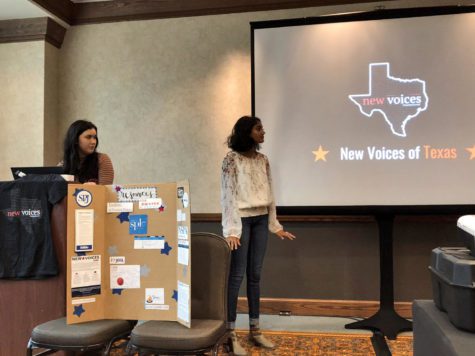Students fight for First Amendment rights
January 31, 2019
Junior Haley Stack and senior Neha Madhira take a break alongside the River Walk in San Antonio during the Texas Association of Journalism Educators Association’s state convention held in San Antonio in October. The two journalists led a workshop there on student press rights and recently received a national award from the Women’s Media Center for their work in that area. “It’s important to remember the power of your voice and how much speaking out and standing up can impact not only your life, but everyone’s around you,” Madhira said. “As student journalists, all of our stories are thoroughly researched and so when we do that, we are providing (readers) with accurate resources.”
Local students receive award
at Women’s Media Center gala
Senior Neha Madhira and junior Haley Stack jointly received the first “Young Journalist Award” at this year’s Women’s Media Center’s ceremony, held before a sold-out crowd at the Capital Nov. 1 in New York City.
According to its website, the WMC, founded by Jane Fonda, Robin Morgan and Gloria Steinem, is a nonprofit organization that works to raise “the visibility, viability and decision-making power of women and girls in media” and to ensure their stories are told.

“They (members of the WMC) try to investigate, save women and report on them,” Madhira said. “They reward women who they think are world-changers, so it’s an honor for Haley and I to be part of that.”
In addition to this award, Madhira and Stack also have been scheduled to give a Ted Talk in Palm Springs, Calif., Nov. 28.
“I was shocked,” Stack said. “We got to walk on the red carpet. We had a publicist telling us what to do. It was crazy because we had never experienced anything like that before.”
Approximately 400 guests attended the awards at Capital in New York City.
“When we were up there giving that speech, it felt insane that we were in the same room winning awards with exceptional women who have done way more in their life,” Stack said. “But somehow we were on the same level as them.”
The WMC’s research and reports, such as the “Status of Women in Media Report,” show studies that take a closer look at the representation of women in media and where they stand in the industry.
“It’s important to remember the power of your voice and how much speaking out and standing up can impact not only your life, but everyone’s around you,” Madhira said. “As student journalists, all of our stories are thoroughly researched and so when we do that, we are providing (readers) with accurate resources.”
Another project is the “WMC Speech Project.” According to the website, its main goal is to increase understanding of the “negative effects” of online misogyny and abuse and to ensure that free speech is a right for all.
“I do believe that a lot of times women who are censored are intimidated because the administrators and people over them with positions of authority are men,” Madhira said. “Once you’re censored, you start to self-censor and you start to drop stories that you deem controversial to yourself. You lose that confidence, and that can affect you when you’re older, not just as a student journalist.”
Author and co-founder of the Sisterhood is Global Institute and the Women’s Media Center, Robin Morgan invited Madhira and Stack to the Women’s Media Center gala after reading their story on local newspapers and having them as guests on the Women’s Media Center Live podcast.
“We not only wanted to criticize the media where it’s gone wrong,” Morgan said. “We also praise where praise is due. They (Neha and Haley) fought it through and they actually won. I wanted to bring more publicity onto the drive for student freedom of the press in high school newspapers as well.”
Stack and Madhira have been invited to write for the “WMC FBomb,” a media platform for teenage feminists to write and tell their stories.
“I think it’s important for journalists to remember that their voices really matter. I think that’s one thing that’s hard to pick up when you’re so put down all the time,” Madhira said. “We hope to keep educating students, advisers and legislatures about the importance of scholastic press rights.”
Senior ENO editor-in-chief Neha Madhira takes on the topic of student press law by posing for the photo here and by authoring the attached editorial. Senator Jose Rodriguez filed S.B. No. 514 Jan. 29, 2019, in the Texas State Senate. This proposed piece of legislation has the support of the New Voices movement in Texas and is meant to protect students from being censored. This free press law has been passed in 14 other states. “Allowing students to express their beliefs without suppressing them not only makes students better critical thinkers, but this freedom also brings in those “real-world situations” they are taught to learn from,” Madhira said. “Without this freedom, students have no voice, and without New Voices, there is silence.”
OPINION: A free press law is imperative for Texas
Texas legislators recognized student voices are worth defending two years ago when they filed a New Voices bill, and it is back for its second session to obtain passage. Senator Jose Rodriguez filed Senate Bill 514 Jan. 29, 2019. New Voices is a student-led legislative movement that protects students from unfounded censorship.
This free press law has already passed in 14 states, and Texas must be the next.
People who stifle student voices are afraid of them. Whether they work at schools or in the community, people who censor want to control what is being said, but that doesn’t stop students from finding this information.
A common example of this is when student media staffs are censored for writing about topics that are “too sensitive” for their school. Information is better than misinformation, and when students don’t receive the information they need from student journalists, who thoroughly research every story reported, they may find false resources elsewhere.
No matter if censorship is happening to student journalists, or to theatre students when parts of their plays are cut out, they are being limited an appropriate or meaningful education. Student voices are still suppressed.
At the same time, having New Voices does not mean everything becomes a Pandora’s box of what can be said or a free-for-all. Student journalists still must legally practice ethics and common sense when it comes to their reporting, while the same responsibility and community standards apply to theatre students or any other student groups.
At schools, students are taught to bring “real-world situations” into their classrooms. In art, students are told the basic guidelines of their assignment, but their creativity is not expressed for them. On the athletic field, students learn plays from their coaches, but they must go out on the field themselves. In a newsroom or theatre production, however, the responsibilities of reporting the truth, or telling the whole story, are taken away from students.
Allowing students to express their beliefs without suppressing them not only makes students better critical thinkers, but this freedom also brings in those “real-world situations” they are taught to learn from. Without this freedom, students have no voice, and without New Voices, there is silence.
See related National publications here:



